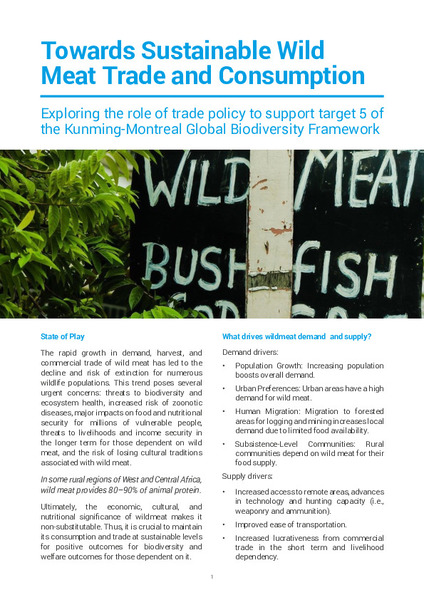| dc.contributor | Industry and Economy Division | en_US |
| dc.contributor.author | United Nations Environment Programme | en_US |
| dc.date.accessioned | 2024-08-01T05:12:51Z | |
| dc.date.available | 2024-08-01T05:12:51Z | |
| dc.date.issued | 2024-07 | |
| dc.identifier.uri | https://wedocs.unep.org/20.500.11822/46010 | |
| dc.description | The rapid growth in demand, harvest, and commercial trade of wild meat has led to the decline and risk of extinction for numerous
wildlife populations. This trend poses several urgent concerns: threats to biodiversity and ecosystem health, increased risk of zoonotic diseases, major impacts on food and nutritional security for millions of vulnerable people, threats to livelihoods and income security in the longer term for those dependent on wild meat, and the risk of losing cultural traditions associated with wild meat. | en_US |
| dc.format | pdf | en_US |
| dc.language | English | en_US |
| dc.rights | Public | en_US |
| dc.subject | meat industry | en_US |
| dc.subject | wild animal | en_US |
| dc.subject | trade (economic) | en_US |
| dc.subject | consumption | en_US |
| dc.subject | zoonotic disease | en_US |
| dc.subject | West Africa | en_US |
| dc.subject | Central Africa | en_US |
| dc.title | Towards Sustainable Wild Meat Trade and Consumption: Exploring the Role of Trade Policy to Support Target 5 of the Kunming-Montreal Global Biodiversity Framework. | en_US |
| dc.type | Factsheets, Infographics and Brochures | en_US |
| wd.identifier.sdg | SDG 2 - Zero Hunger | en_US |
| wd.identifier.sdg | SDG 8 - Decent Work and Economic Growth | en_US |
| wd.topics | Finance and Economic Transformations | en_US |
| wd.identifier.pagesnumber | 3 p. | en_US |


